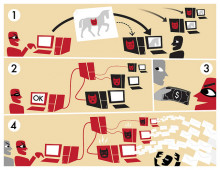Botnet master gets 30-month prison term for renting out infected PCs
A hacker who controlled a botnet of 72,000 computers and rented out command-and-control access to various malcontents was sentenced to 30 months in prison today, the Department of Justice said.











































































